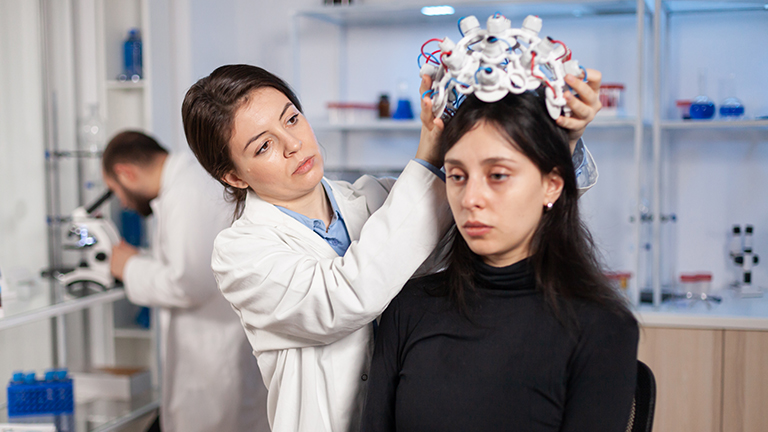Recognising the early symptoms of Huntington’s is significant for early detection and intervention. In this article, we will review the most common the initial signs seen in patients with Huntington’s disease, voice the recommendations from the experts, and provide a few suggestions about ways to detect the more subtle changes in behaviour, movement and cognition.
Introduction to Huntington’s Disease
Huntington’s disease is an uncommon, inherited neurological disorder that affects both the brain and the body. The disorder is caused by a mutation in the HTT gene that causes an abnormal protein called huntingtin to be created. Gradually, this protein damages specific areas in the brain, particularly those that control movement, thinking, and emotions. Recognising the signs of Huntington’s disease early on is especially important because it is a gradually progressive disorder that worsens over time.
Approximately 3 to 7 per 100,000 people worldwide are diagnosed with Huntington’s disease. The disease is particularly more prevalent among individuals of European ancestry, with higher prevalence among populations in the US, UK, and Canada. Although it is a rare condition in itself, the inherited aspect of the disease makes it problematic and devastating to families.
Understanding the Genetic Basis of Huntington’s Disease
Huntington’s disease is defined as a genetic disorder because it is passed on in an autosomal dominant manner. This means that if one parent carries the faulty gene, then each child has a 50% chance of inheriting that gene. The mutation consists of an abnormal repeat of a DNA sequence (CAG repeats) in the huntingtin gene. The more repeats present, the earlier the symptoms are typically manifested.
Since Huntington’s disease is genetically heritable, early signs could develop in an individual who has known family history of the disease. Genetic tests can determine the presence of the mutation, but whether to get a genetic test is a personal decision, often influenced by ethical and emotional factors.
What Are the Early Signs of Huntington’s Disease?
In the initial onset of Huntington’s disease the signs may be overlooked and misinterpreted as either depression, anxiety or aging-related changes. Identifying these early symptoms and signs is essential for making a timely diagnosis and planning best care.
Subtle Behavioural Changes in the Early Stages
A leading early symptom of Huntington’s disease is a change in patient behaviour and personality. With subtle, imperceptible yet significant behavioural change, the person with Huntington’s disease develops an irritable, impulsive or even more cautious demeanor. Family caregivers often notice change first. Signs of early change in behaviour may include:
- – Irritability and impulse behaviour outbursts
- – Decreased involvement in recreational activities or work
- – Trouble completing daily tasks
- – Strange, unexplained indifference and changes in motivation
Initial Motor Symptoms to Look Out For
Huntington’s disease is characterised by movement disorders, or motor symptoms for simplicity, or simply movement. However changes in movement often follow behavioural change noted by most close observers. Early motor symptoms of Huntington’s disease include:
- – Small, involuntary movements (chorea) which may appear normal
- – Frequent clumsiness (falling, tripping, etc) – Trouble maintaining balance
- – Difficulty with writing or fine motor tasks (buttoning up a shirt or tying shoes, etc)
Given the course and progression of the early stages of Huntington‘s disease, symptoms may worsen overtime and later become more disruptive in terms of movement.
Early Cognitive Impairments
The cognitive decline in Huntington‘s disease can often be insidious. While patients have trouble with their focus, we refer to them as “cognitive difficulties.” Some early cognitive difficulties may include:
- – Planning and organising
- – Focusing
- – Forgetfulness
- – Slow thinking
Psychological and Emotional Warning Signs
Psychological symptoms are often some of the most noticeable symptoms. These symptoms include depression, anxiety, and bizarre mood swings. In more serious cases, an individual may develop obsessive-compulsive behaviours or experiences of psychosis. These symptoms will often bring individuals into contact with mental health services before a diagnosis of Huntington’s disease.
How Early Signs Differ from Advanced Symptoms
When Do the First Symptoms Usually Appear?
Symptoms generally develop between the ages of 30 and 50. However, onset varies due to genetic factors, especially the number of CAG repeats in the gene. Symptoms may emerge in childhood (juvenile Huntington’s disease), and onset may continue into the 70s.
How Doctors Diagnose Huntington’s Disease in Early Stages
The process of diagnosing includes an amalgamation of clinical evaluation, neurological exams, and genetic tests. Many physicians look for early warning signs including small unintended movements, mood alterations, difficulty concentrating, etc. Scans such as MRI and CT may also demonstrate changes in the brain before there are severe symptoms.
The Importance of Recognising Signs Early
Recognising early symptoms allows patients and families to make plans for the future. While there is no cure, early identification can help with:
- – Consulting with genetic counselling
- – Considering clinical trials
- – Making lifestyle alterations
- – Planning for future long-term needs
Expert Opinions on Early Signs of Huntington’s Disease
As noted by neurologists who focus on movement disorders, the initial symptoms of Huntington’s disease are usually missed because they can be mistaken for mental health issues or minor ageing-related changes. However, experts say subtle irritability, mild cognitive decline, or mild coordination should not be ignored, particularly in someone with a family history of Huntington’s disease.
The Huntington’s Disease Society of America agrees on the importance of early detection as a means to access support services, clinical research, and psychological counselings for both the individual and family caregivers.
Living with Early-Stage Huntington’s Disease
Huntington’s disease in its early stages can be managed with assistance received from healthcare professionals, therapists, and family. Management strategies include exercise, consistently established daily routines, and cognitive training activities. Psychological support is also important to deal with emotional changes.
Can Lifestyle Changes Delay Symptom Progression?
Although lifestyle changes cannot stop Huntington’s disease from starting, there is research that shows these changes may slow the development of disease symptoms. Regular physical activity, activities that stimulate the brain, a balanced diet, and stress management can help improve quality of life. Some studies reveal that social engagement helps maintain cognitive function longer.
Frequently Asked Questions About Early Huntington’s Signs
Can it begin without motor symptoms in Huntington’s Disease?
Yes – in many cases, emotional and cognitive symptoms can appear prior to motor symptoms such as chorea.
How to long do the early stages of Huntington’s Disease last?
The early stages of symptoms can last for a number of years and start to progress to advanced stages. The timeline varies for each person.
Can children exhibit early signs of Huntington’s Disease?
Indeed, juvenile Huntington’s Disease is rare but does exist. It involves not only cognitive symptoms of learning but stiffness and potentially seizures, as opposed to the motor symptoms associated with adults.
Is there treatment for sign of early disease?
While there is currently no cure, treatment is available to stabilise mood disorders, lessen involuntary movement, and preserve cognitive function as long as possible.
Final Thoughts on Early Detection
Identifying early unique signs of Huntington’s disease is essential for an early diagnosis and treatment. The signs can vary from insidious as changes to behaviour or minor movement and cognitive deficits. They should never be ignored, especially for individuals with a familial history of the disease. Huntington’s disease has not been curtailed, however, gaining early insight into its unique markers will allow for more holistic planning, increased quality of life, and access to support, care, and potential clinical trials. A better understanding of these unique signs provides a sense of empowerment, which can begin proactive healthcare management.


